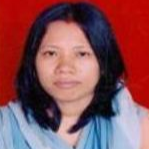
Ksh. Krishna B Singha
Work place: Department of Computer Science, Assam University, Silchar, 788011, India
E-mail: ksworks2010@gmail.com
Website:
Research Interests: Computational Learning Theory
Biography
Ksh. Krishna B Singha is a Research scholar, in the Department of Computer Science, Assam University, Silchar, India since 2010. She did her Master of Computer Applications from Manipur University, Canchipur, India. Recently she has completed her degree for the Doctor of Philoosophy in Computer Science. Her research interests include Morphological Analysis, Machine Learning, POS Tagging, Fuzzy Set Theory, Fuzzy Logic, etc.
Author Articles
A Morphological Analyzer for Reduplicated Manipuri Adjectives and Adverbs: Applying Compile-Replace
By Ksh. Krishna B Singha Kh. Dhiren Singha Bipul Syam Purkaystha
DOI: https://doi.org/10.5815/ijitcs.2016.02.04, Pub. Date: 8 Feb. 2016
Finite-state implementations naturally denote concatenations of morphemes and are limited to modeling concatenative morphotactics. The non-concatenative structure, such as reduplication, in the computational morphology of many world languages cannot be handled completely by finite-state technology. This paper describes the non-concatenative phenomena of reduplication, occurs in the adjective and adverb word classes of Manipuri language using the formalism of finite-state morphology tools and techniques. The discussion covers the non-concatenative nature and the challenges in capturing the various reduplication phenomena exhibited by the two classes; then present a morphological analyzer of the reduplicated adjectives and adverbs. It has been implemented using XFST and LEXC with the application of compile-replace algorithm to the morphotactics description of the language, which includes finite-state operations other than concatenation, to capture reduplication phenomena.
[...] Read more.Other Articles
Subscribe to receive issue release notifications and newsletters from MECS Press journals